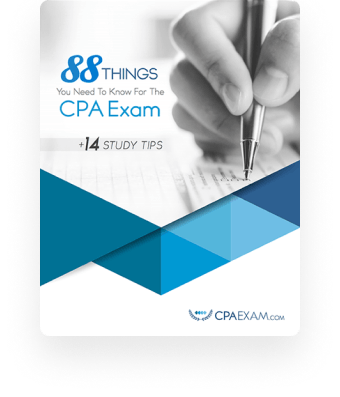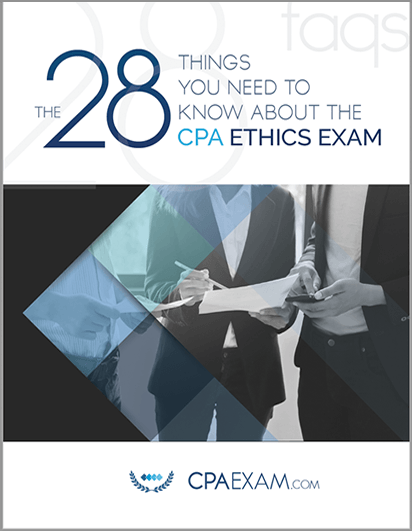
The CPA Exam Study Guide: 88 Things You Need to Know for the CPA Exam + 14 Study Tips
Includes info on:
- How to prepare for the CPA exam
- How and what to study for the CPA exam
- How to choose the right CPA review course
- Bonus of 14 study tips we’ve seen used time and time again with positive results.
CPA candidates across the country have relied on this free guide to pass — join them now!
Understanding the CPA Exam
What is the CPA Exam?
The CPA exam is a challenging, four-part test administered by the Association of International Certified Professional Accountants (AICPA). Passing the CPA exam is a fundamental step toward earning your CPA license. The Uniform CPA Examination is widely considered a difficult test, with historically low pass rates and rigorous content tested across multiple disciplines.
With the launch of CPA Evolution in 2024, the CPA licensure model has shifted to reflect the changing landscape of public accounting and business. This model introduces specialization while maintaining a solid core of accounting knowledge.
CPA Evolution & Specialization
CPA Evolution requires candidates to pass three Core Sections and one Discipline Section. This allows CPA candidates to tailor their path based on career goals and strengths:
Core Sections (Must complete all 3):
- Financial Accounting and Reporting (FAR) – Covers financial statements, balance sheet accounts, and financial reporting.
- Auditing and Attestation (AUD) – Covers audit procedures, professional responsibilities, and internal controls.
- Regulation (REG) – Covers federal taxation, business law, and tax preparation.
Discipline Sections (Choose one):
- Business Analysis and Reporting (BAR) – Emphasizes data management, financial analysis, and reporting requirements.
- Tax Compliance and Planning (TCP) – Focuses on entity tax compliance, property transactions, and federal tax procedures.
- Information Systems and Controls (ISC) – Covers organization controls, information systems, and further procedures.
| CPA Exam Sections Summary |
|---|
| Core: FAR, AUD, REG |
| Discipline (Choose 1): BAR, TCP, ISC |
| Total Testing Time: 16 hours |
| Question Types: MCQs, TBSs |
| Testing Mode: Prometric Centers |
Exam content also tests higher-order skills such as analysis, evaluation, and application, making familiarity with all question types critical.
CPA Exam Format and Content
All four CPA exam sections use two types of questions:
- Multiple Choice Questions (MCQs) – Test your foundational knowledge.
- Task-Based Simulations (TBSs) – Require real-world application through scenarios.
Each exam section includes 4 hours of test time. Here’s how content is weighted:
| Exam Section | MCQs | TBSs |
|---|---|---|
| FAR | 50% | 50% |
| AUD | 50% | 50% |
| REG | 50% | 50% |
| BAR | 50% | 50% |
| TCP | 50% | 50% |
| ISC | 60% | 40% |
Exam content also tests higher-order skills such as analysis, evaluation, and application, making familiarity with all question types critical.
Registration Logistics, Testing Windows & Fees
CPA Exam Application Process
- Apply through your state board of accountancy.
- Submit transcripts and meet the CPA exam requirements.
- Pay the CPA exam application fees and receive your Notice to Schedule (NTS).
Testing Windows and Exam Dates
The CPA exam now offers continuous testing, meaning you can schedule your exam year-round through Prometric testing centers. There are no blackout months.
CPA Exam Fees
| Fee Type | Typical Cost |
|---|---|
| Application Fee | $50 – $200 (varies by state) |
| Exam Section Fee (each) | ~$200 – $250 per section |
| Total Exam Fees | ~$800 – $1,000+ |
Note: Fees and schedules may vary slightly by jurisdiction.
Choosing a CPA Review Course
Selecting the right CPA review course is essential. Here’s how to choose:
- Match Learning Style: Choose between video lectures, live classes, or textbooks.
- Course Reputation: Research pass rates and student testimonials.
- Comprehensive Content: Aligns with the CPA exam blueprint and covers topics such as financial accounting, tax compliance, and internal controls.
- Practice Exams & Questions: Look for abundant MCQs, task based simulations, and simulated CPA exam questions.
- Instructor Support: Access to expert instructors and mentoring adds value.
Popular options include Becker CPA Review, Roger CPA Review, and others that offer comprehensive textbooks and digital tools.
Developing a Study Plan
Using a CPA Exam Study Guide
A high-quality CPA exam guide will:
- Follow the AICPA blueprint
- Include summaries of exam content
- Provide study schedules and CPA exam questions
- Help monitor progress and build confidence
Creating Your Own Study Guide
Personalized guides let you:
- Focus on weak areas like taxation and regulation (REG section) or business analysis (BAR section)
- Integrate resources like practice exams, charts, and reference tools
- Use planners to track study hours and content covered
14 Study Tips to Pass the CPA Exam
- Set a realistic study schedule.
- Use a study planner.
- Break down topics into manageable parts.
- Prioritize core sections before diving into disciplines.
- Use multiple resources (videos, flashcards, textbooks).
- Simulate exam conditions regularly.
- Take full-length practice exams every few weeks.
- Focus on high-weighted content.
- Track your progress.
- Don’t skip task based simulations.
- Use memory techniques for tricky areas.
- Stay up to date on CPA exam requirements.
- Join a CPA candidate community or study group.
- Take care of your health – mental clarity matters.
FAQ – Frequently Asked Questions
How long do I have to pass all four sections?
You must pass all four sections within an 18-month rolling window.
Can I choose the order of CPA exam sections?
Yes. Many CPA candidates start with FAR due to its volume, but it’s up to your comfort and background.
What if I fail a section?
You can retake any section, but you’ll need to pay the exam section fee again. Strategize to avoid expiration of previously passed sections.
What are CPA exam scores based on?
Scores are based on weighted performance in MCQs and TBSs, not raw scores. The passing score for each section is 75.
Are international candidates eligible?
Yes. Some jurisdictions allow international testing. Confirm with your state board and review international eligibility.
When should I apply for the CPA exam?
As soon as you’ve met the educational and eligibility requirements. The CPA exam application and approval process can take several weeks.
Key Takeaways
Understand each exam section and its format.
Select a review course that offers ample CPA exam questions and practice exams.
Use a structured CPA exam study guide aligned with the CPA blueprint.
Be aware of your exam date, fees, and registration deadlines.
Master core topics like financial accounting, federal taxation, and business law.
Strategize with discipline sections: TCP section, ISC section, or BAR section.
By leveraging the ultimate CPA exam guide and staying consistent, you’ll increase your chance to pass the CPA exam and earn your certified public accountants credential.
Ready to begin? Start your CPA journey today with a structured plan and proven strategies!
